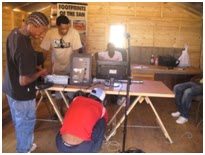Case study on the implementation of Records Management at a merged higher education institution.
It was organised by the Department of Information and Knowledge Management at UJ (Kingsway Campus).
Quote from the original invite:
"As part of the corporate governance strategy at the University of Johannesburg, access to information is the management of paper and electronic records within a secure environment. Technology provides the tool to capture, manage and access content and to provide a workable retention schedule for paper and electronic records. The methodology developed includes a phased-in approach with the focus on legislative compliance, business processes and change management principles. This required compliance with the Promotion of Access to Information Act on the one hand and the Protection of Personal Information bill whilst complying with King III directives."
The seminar was presented by Elize de Wet, Director Corporate Governance at UJ, with assistance by Nicolette Olivier, Records Manager at UJ.
The records management process was started two years back at UJ. It had to incorporate the merged higher education institutions of all the campuses now falling under the banner of the University of Johannesburg.
Interesting points mentioned at the seminar:
- They discovered very early on that the implementation of a records management constitute a Change Management process, and had to handle it accordingly.
- They had to use a phased-in approach.
- There is not one recipe for everything in records management. They had to look at the business of the different departments and sections and what business they subscribes to.
- The paper records must drive the system, and not the other way round.
- The appointment of a business administrator as well as a business analyst are very important for the process.
- The most interesting point to me was the fact that they assigned categories to disciplines and then to the types of documents. The feeling is that the focus should have been on the types of documents, and not on the disciplines as point of departure.
- Metrofile store their paper records off-site, which saves a lot of money in terms of space and storage, and is accessible within a few hours when requested.
The records management system is now "just a click away...", and they have buy-in from most of the stake-holders.
The proof is in the pudding: Their records are available on-line, immediate, and a paper trial can be accessed electronically for most of the records, especially since some of it (like student records) need to be kept for life!
Blog post by Karen du Toit, Sound Archivist, SABC Radio Archives.






























